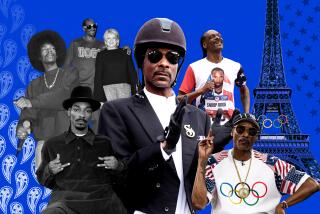Spoon’s Sidekick Is Just a Regular Guy
- Share via
There are probably a million and one ways to break into show business, but nobody, before Bob Wieland, had ever done it by running the New York City marathon on his arms.
Wieland, 41, lost both his legs nearly 20 years ago when he stepped on an 82-millimeter booby trap while trying to drag a wounded soldier from a battlefield in Vietnam. Today, thanks to a moving ABC “Wide World of Sports” feature on his four-day assault on the 1986 New York marathon course, Wieland sleuths the seedy streets of a generic East Coast city as a regular on NBC’s new detective series, “Sonny Spoon.”
Wieland says it was that report--showing him swinging himself forward on his arms, a yard at a time--that caught the attention of “Sonny Spoon” executive producer Stephen J. Cannell. “He said, ‘Wow, this dude is something else. We have to track him down.’ ”
In an effort to reflect an urban grittiness, the creators of the show (airing Fridays at 10 p.m.) developed a Gothic character they described as a “legless derelict” who transports himself through the back alleys of the city on a skateboard.
At first the producers were undecided whether to cast an actual amputee or hire a short character actor to “fake it,” a la Eddie Murphy in “Trading Places.”
“Personally, I was concerned about giving the role to an amputee,” says Randall Wallace, one of the producers. “Acting is a demanding profession and people who can do it well are extremely rare. I was worried that if we cast someone who wasn’t really an actor, and they weren’t very good, we would probably have used them less and less and that would have been more cruel than not having cast them at all. If our good intentions were to give a handicapped person an opportunity, and we didn’t follow through with it, then we would have just been using that person.”
But Cannell--who cast Jim Byrnes, another double amputee who gets around in a wheelchair, in a regular role on the CBS series “Wiseguy,” and who used several deaf actors in last Saturday’s episode of “Hunter”--demanded that the part be given to an amputee.
Cannell’s insistence stemmed from having attended an awards ceremony for disabled actors several years ago at which he heard a number of them bemoaning the fact that many parts they could play were being given to actors without disabilities. He says he made himself a promise never to fall into that trap.
“As a dyslexic who had a lot of trouble in the early part of my academic life, I know how important it is that you keep your spirit,” Cannell says. “The thing I like best about Bob (Wieland) is that he says, ‘Yeah, this is a disadvantage, but I can do anything that you can do.’ So many people quit when faced with a disability, and I really appreciate someone who doesn’t.
“I’m no crusader, but I feel good about (using Byrnes and Wieland) because they’re good guys. The thing I like best about them is that they are out there plugging away despite their disability. They deserve the opportunity that they got.”
Since returning without legs from Vietnam, Wieland had already attained a certain level of celebrity for his remarkable feats of athletic courage and strength: He twice broke the world record in the bench press, the second time with a lift of 507 pounds; between 1982 and 1986, he walked on his arms all the way from Knott’s Berry Farm in Buena Park to the Vietnam Memorial in Washington to raise money for charity, and just this month, he completed the Los Angeles Marathon in a personal best time of 3 days, 2 hours, 8 minutes and 26 seconds.
George Allen, former professional football coach and national expert on physical fitness, has called Wieland’s 2,784-mile, four-year walk across the United States the greatest athletic achievement of all time.
At less than 3 feet tall, Wieland, a born-again Christian who credits his phenomenal physical achievements to his faith in God, is anything but handicapped. He is married, drives his own van and insists that he can pin any normal-sized man to the floor in two seconds.
When he auditioned for the part on “Sonny Spoon,” Wieland had never acted before, but he impressed the producers with his unbridled optimism and zeal for living. However, when he read the first script and saw his character, Johnny Skates, described as a “legless, derelict panhandler” who hung out with winos and whores, Wieland told Wallace that he didn’t want to do it.
“I’ve been working all these years to project a positive image of somebody who was injured in Vietnam,” Wieland says. “I wanted no part of a legless, derelict panhandler. If I wanted to, I could act real helpless and I could get all kinds of people to feel sorry for me. But I have to look myself in the mirror every day, and I’d be too embarrassed to be anything other than who I am.”
Without much hesitation, Wallace agreed to rewrite the character to fit Wieland’s outgoing and fiercely independent personality. And in a new twist on the idea that the fortunate should aid the poor and the handicapped, the disabled Skates regularly helps the able-bodied Sonny Spoon (played by Mario Van Peebles) get out of tough situations.
In the premiere episode, Skates jumped off his skateboard to tackle two hoodlums who had been chasing Spoon. As the bad guys picked themselves off the sidewalk, the legless Skates stood up to them, taunting them to tangle with him some more. Meanwhile, his pal Sonny escaped down a side alley.
“When I had to tackle that guy, I moved so fast on my arms that the camera couldn’t keep up with me,” Wieland jokes. “I ran so fast that I faked them out the first time.”
Speaking a few lines here and there, Wieland will appear in five of the first seven episodes of the show. Recently, NBC ordered 13 additional episodes, and Wieland and the show’s producers are currently talking about expanding his role.
With his new visibility on television each week, Wieland is sensitive about being labeled an inspiration or a role model for other disabled people.
“I’m not into saying this guy is disabled, this guy is black, this guy is white, this guy is in a wheelchair,” Wieland says. “I’m trying to dispel all these things. People always say, ‘Wow, you must really be into helping the disabled.’ And I say, ‘No, I’m into helping people,’ and if they happen to be in a wheelchair and I can be some encouragement for them, fine. But I’m about motivating people, period.
“I don’t want to be called a handicapped athlete or a disabled actor. I’m just an athlete and an actor facing the same challenges in life that everyone else faces and trying to do the best that I can.”
More to Read
The complete guide to home viewing
Get Screen Gab for everything about the TV shows and streaming movies everyone’s talking about.
You may occasionally receive promotional content from the Los Angeles Times.






